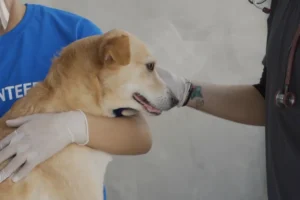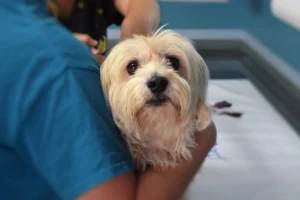Kennel cough is essentially doggie bronchitis, an upper respiratory infection. Bacteria and viruses cause it, which transmit to other animals via airborne droplets and contaminated surfaces. It frequently spreads swiftly through kennels and animal shelters.
However, bacteria that cause kennel cough in dogs and cats, known as Bordetella bronchiseptica, can potentially infect people. Kennel Cough spreads via airborne droplets, infecting you, surfaces, or your clothing. You can infect your dogs in various ways.
A doctor will usually prescribe antibiotics if infected with the bacterium that causes kennel cough. The infection should clear up in 2-3 weeks without additional therapy.

How Can Humans Spread Kennel Cough to Dogs?
When humans contract bordetella, they get whooping cough. When ill, you always have a small risk of infecting another dog through coughing or sneezing droplets. The disease can be transferred by contact with infected dog-related objects such as food/water bowls, crates, beds, and clothing.
For peace of mind, always disinfect your shoes and other objects with alcohol disinfectant and wash your clothes hot. While human-to-dog transmission is relatively rare, it’s still possible, especially if one is frequently in close contact with their pet while showing symptoms.
The transmission of kennel cough occurs in two ways.
Tiny saliva droplets generated during coughing are the primary infectious pathway. As a result, the central infection occurs when a healthy dog comes into touch with a sick dog that emits these infected particles.
The second way to become infected is to contact objects that saliva droplets have contaminated. However, this infection is considerably less severe/likely since the viruses and bacteria that cause kennel cough do not survive long in these things (fomites).
Most URIs (upper respiratory infections), like those in humans, will resolve on their own as long as the dog continues to eat and isn’t struggling to breathe. If they are, a trip to the vet is a must.
Because they are stress-mediated, they are more common in high-density kennels such as boarding or shelters and less common in residential contexts.
The sickness significantly impacts young and elderly animals, and its consequences can kill sensitive animals. Fortunately, vets can immunize your pets against the most prevalent strains in the same way that people get flu shots. And please, don’t hesitate to take your dog to the vet even if you’ve never been to one before.
This is how kennel cough appears in dogs:
How Can Dogs Get Kennel Cough?
“Kennel cough” refers to how an infected dog can quickly infect other dogs, especially if they are all trapped in a relatively confined location, such as a kennel, a shelter, a multi-dog household, a groomer’s shop, or even a vet’s office lobby.
Transmissions can occur even with brief contact, such as two dogs colliding (and exchanging a fast mutual sniff and greet) during a walk, at a dog park, or when the dog licks another one’s urine.
Inhaling aerosolized germs or viruses from an infected dog can cause kennel cough in a healthy dog. Coughing or sneezing from an infected dog can spread the germs and/or virus, and dogs can also get it through infected things such as toys and food/water bowls.
Given that kennel cough is airborne, it’s crucial to ensure that ventilation in such confined spaces is adequate to prevent the accumulation of infectious particles.
Symptoms of Kennel Cough (in dogs and humans)
A persistent and ineffective dry cough is the primary sign of kennel cough in dogs. It usually sounds like a goose honking or something becoming caught in your dog’s throat. Other symptoms include a runny nose, sneezing, fatigue, a loss of appetite, and a low fever.
Kennel Cough symptoms in humans include:
- A persistent cough.
- a painful throat
- swallowing difficulties
- Breathing difficulty
- fever
It’s worth noting that while the Bordetella bacterium can infect humans, the manifestation in people, typically known as whooping cough, is primarily caused by a different strain, Bordetella pertussis.
How Long Should I Quarantine My Dog if He Has Kennel Cough?
Because Kennel Cough is very contagious to other dogs, it is recommended that you isolate your dog for about two to three weeks. However, this can vary depending on the severity of the infection, and complete healing may take six weeks for older dogs and pups.
That means no trips to the groomer, the dog park, the puppy school, or any other place where many dogs get together. The dog should not come into contact with any other dogs until you determine whether her cough is contagious.
Always keep tissue paper in your pocket when taking her on a walk. You may want to wipe out any fluid she coughs and spits out to avoid contaminating other dogs.
If your veterinarian wishes to undertake lab testing on the sputum, you could collect it in a clean doggy poo bag, but it must be fresh to be analyzed.

If your dog appears to be in good health and eats well, you should be able to employ home treatments to make him more comfortable. This includes keeping the dog in a humid environment and without wearing a collar. Light play and walks are acceptable, but she should not play fetch or do anything that causes her to pant.
Using a harness instead of a collar during walks can reduce the pressure on your dog’s trachea, potentially alleviating cough triggers.
Can I Leave My Dog Alone With Kennel Cough?
Don’t leave your dogs alone in a humid room or force them to stay there if they aren’t comfortable. Crating them is safe and will not interfere with his kennel cough therapy. Keep a bowl of water in the crate.
Keep your dog away from others and remember that they will be highly contagious when ill and can spread kennel cough for up to 2-3 weeks after their symptoms have subsided.
FAQs
How Long Does Kennel Cough Last on Surfaces?
Kennel cough can live on surfaces for up to 48 hours. It’s essential to clean and disinfect counters, tables, floors, walls, cages, bowls, toys, and other areas regularly after touching different pets.
Can kennel cough spread to cats?
The term “kennel cough” refers to three different diseases (only two of which have vaccinations), and the symptoms are similar to those of several others. Some are zoonotic (infect many species) in dogs and felines. However, they don’t cross species very quickly. To be safe, keep them apart until a veterinarian clears them.
Can a dog get kennel cough twice?
As with common colds in people, there are numerous strains of kennel cough, so your dog may contract the sickness multiple times. However, if your dog has been infected with the Bordetella bronchiseptica strain, they will be immune to reinfection for six to twelve months.
Alex, a passionate animal lover, has experience in training and understanding animal behavior. As a proud pet parent to two dogs and three cats, he founded AnimalReport.net to share insights from animal experts and expand his knowledge of the animal kingdom.









